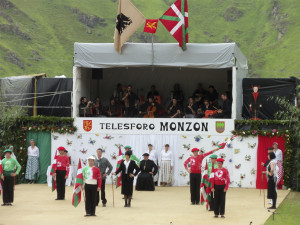Popular theatre is limited to a small region of Euskal Herria, mainly Zuberoa and its mountainous areas. There are several types of performances within the popular theatre genre: plays for Carnival season, masquerades, xaribariak or tobera-mustrak and pastorala. The Zuberoan Pastorala encloses all types of plays (drama, comedy, tragedy), and the performers are village shepherds, workers, etc. Manuel Lekuona defined pastorala as a variety of popular theatre which blends music, dance and poetry.
They might have been different in the old days, but nowadays these performances report on historical events that occurred in Euskal Herria and famous Basque characters, although their main subject is the endless fight between goodness and badness, and the final victory of virtue over evil.
Annually in the summertime, a village is responsible for the organization of the Pastorala play. The show is always outdoors, without shelter: in the village square, at the pelota court, in a field… The stage is a wooden platform with a curtain at the back, and on top of it, there is a second flooring where the musicians are accommodated. The setting has three doors: looking at the audience on the right, the door from where the Christians appear; the Turkish come on stage through the left door; and the children who play the part of the angels use the central door. Each group of characters wears their peculiar costumes: Christians (the main character, workers, warriors, church people…) wear blue garments, Turkish (English, Spaniards, pagans…) dress in red and the angels in white.
Once upon a time the actors were all male; nowadays, on the contrary, men and women take part. The play starts with the actors and the actresses marching through the streets of the village. Later, on stage, an actor with a powerful voice reads out what is called lehen perediküa. This act serves several purposes: to greet the audience, to introduce the theme of the play, to make a short account of the show and to announce the actors and actresses on stage. The players are directed by Errejenta or Pastoralierra. The representation lasts three to four hours and is divided in jelkhaldiak or scenes. The last farewell or azken perediküa is read out showing the participants’ gratitude.
The dialogues and actions constitute the core of the Pastorala play and follow a set musical pattern and a fixed way of moving on stage. Nevertheless, the participants sporadically and at peak moments perform pieces with lyrics and tunes composed for the occasion.



